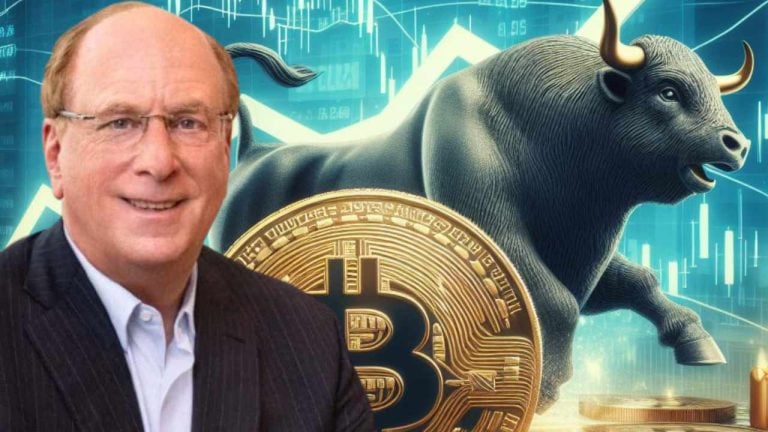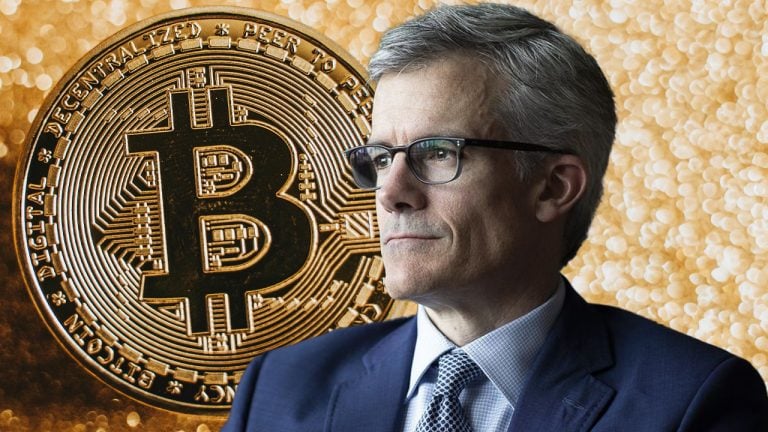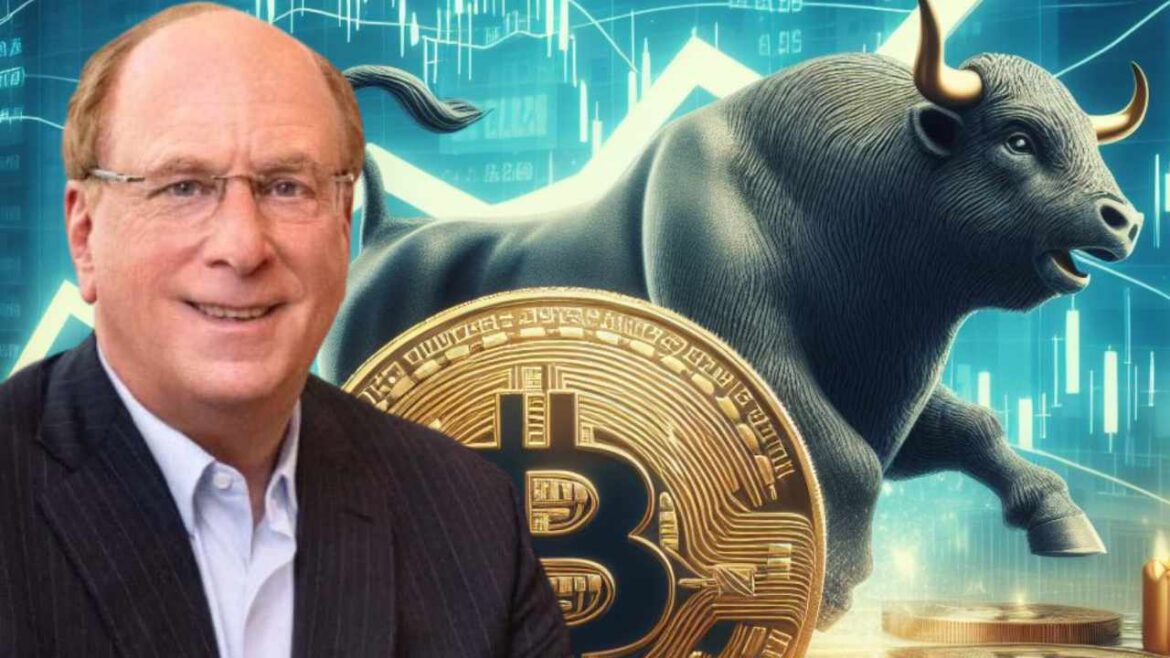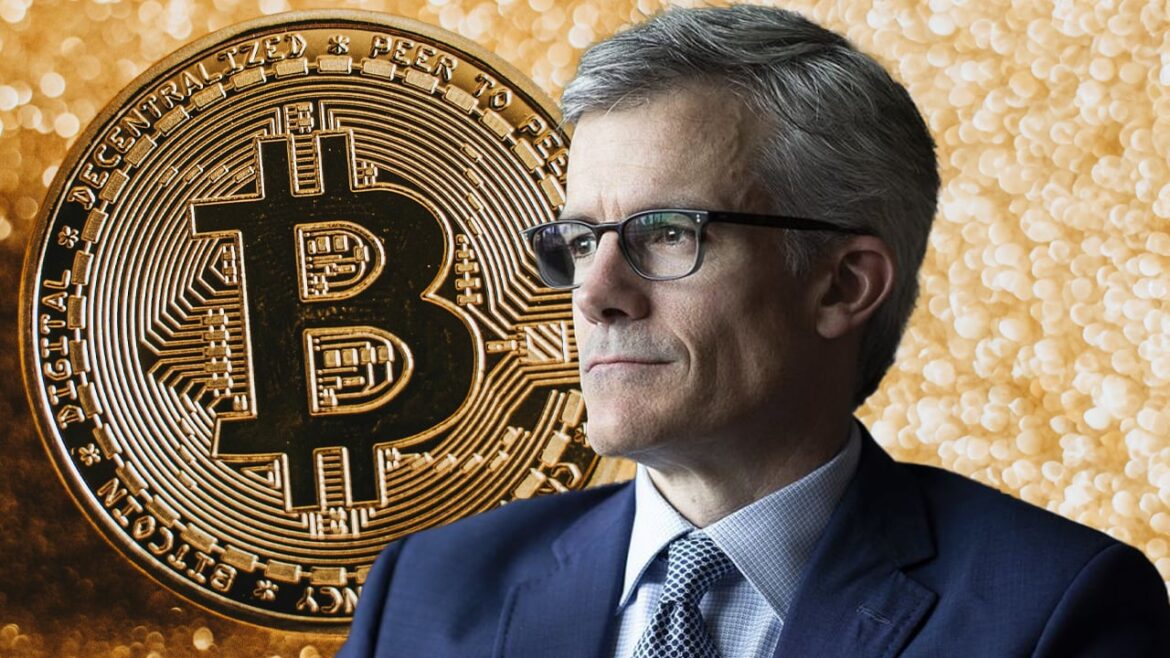 The CEO of Blackrock, the world’s largest asset manager, Larry Fink, says he is “very bullish on the long-term viability of Bitcoin.” Noting that he is “pleasantly surprised” by the demand for Blackrock’s spot bitcoin exchange-traded fund (ETF), he emphasized that the Ishares Bitcoin Trust (IBIT) is “the fastest growing ETF in the history of […]
The CEO of Blackrock, the world’s largest asset manager, Larry Fink, says he is “very bullish on the long-term viability of Bitcoin.” Noting that he is “pleasantly surprised” by the demand for Blackrock’s spot bitcoin exchange-traded fund (ETF), he emphasized that the Ishares Bitcoin Trust (IBIT) is “the fastest growing ETF in the history of […]
Source link
CEO
Former FTX CEO Sam Bankman-Fried sentenced to 25 years in landmark fraud case

Sam Bankman-Fried, the former CEO of FTX, was sentenced to 25 years in jail today in a packed courtroom, marking a significant moment in the legal scrutiny of the crypto industry. He will be 57 years old when he is released. The sentencing, as detailed by Inner City Press, comes after a series of legal proceedings that shed light on the complexities and potential vulnerabilities within the digital asset space.
Bankman-Fried, dressed in a light brown jail uniform from MDC-Brooklyn, faced the judgment of Judge Lewis A. Kaplan, who, after considering the pre-sentence report and the guidelines disputes, delivered a sentence that reflects the gravity of the crimes committed. The courtroom, filled with prosecutors, defense lawyers, and an FBI agent, bore witness to the culmination of a case that has been closely followed by both the crypto community and the general public.
The legal proceedings highlighted the extensive financial losses incurred by investors, lenders, and customers, with Judge Kaplan rejecting the defense’s argument about the loss amount. The court found that investors lost $1.7 billion, lenders lost $1.3 billion, and customers faced an $8 billion shortfall. These figures underscore the scale of the fraud and the impact on the victims involved.
The defense had previously sought leniency, citing Bankman-Fried’s autism diagnosis and arguing for a reduced sentence of 63 to 78 months. However, the prosecution argued for a substantial prison term of 50 years.
Judge Kaplan’s decision to vary downward from the Guidelines range while still acknowledging the significant number of victims and the use of sophisticated means emphasizes the complexity of sentencing in cases involving emerging technologies and financial structures. The finding of obstruction of justice, including attempted witness tampering and perjury, further emphasized the deliberate actions taken by Bankman-Fried to mislead and defraud.
Human cost of FTX collapse
During the sentencing hearing, a poignant moment unfolded as victims were given the opportunity to address the court. One such victim, Sunil Kavuri, who traveled from London specifically for this purpose, shared his experiences and the impact of the FTX collapse on him and others. Kavuri highlighted the ongoing struggles faced by victims, challenging the narrative that the loss was zero and criticizing the handling of the bankruptcy estate. He pointed out the significant discrepancies in the valuation and sale of assets, including a token that significantly appreciated in value after being sold at a discount and the sale of Solana tokens at a 70% discount.
Kavuri’s testimony underscored the real and continuing harm suffered by those affected, including the tragic note that at least three individuals had committed suicide as a result of the fraud. Judge Kaplan acknowledged Kavuri’s points, reinforcing the gravity of the situation and the inaccuracies in claims that customers would be made whole. This victim’s statement added a deeply personal dimension to the proceedings, emphasizing the human cost of financial crimes and the need for accountability beyond the sentencing of Bankman-Fried.
SBF lawyer describes him as ‘misunderstood’
In a heartfelt defense of his client, Sam Bankman-Fried’s attorney, Mark Mukasey, presented a contrasting image of the former FTX CEO to the court. Mukasey argued that Bankman-Fried’s actions, while resulting in significant financial fallout, were not driven by the same malice or predatory intent that characterized other high-profile financial criminals, such as those who stole from Holocaust survivors. He emphasized that Bankman-Fried was not a “ruthless financial serial killer” but rather someone who made decisions based on mathematical calculations, not with the intention to cause personal pain.
Mukasey also relayed personal insights from Bankman-Fried’s mother, who described her son as misunderstood and not fitting the mold of a “greedy swindler.” According to Mukasey, Bankman-Fried did not abscond with funds but remained engaged until the end, with a genuine desire to see people repaid. This narrative was allowed to be presented in court partly due to Judge Kaplan’s decision to depart from the usual practice of enumerating the papers considered for sentencing, acknowledging the overwhelming volume of last-minute submissions from both the defense and the prosecution.
The defense’s portrayal of Bankman-Fried aimed to humanize him and differentiate his case from other financial frauds, suggesting that while the consequences of his actions were severe, his motivations were not inherently malicious. Mukasey’s statement also served as an acknowledgment of the victims’ suffering, expressing an understanding of their pain and a commitment to appeal, while maintaining respect for the jury’s verdict.
In a plea to the court, speaking directly Bankman-Fried admitted,
“I made a lot of mistakes. But that’s not how the story ended. Customers weren’t paid back. FTX didn’t survive that. Yeah, customers have been given conflicting claims. That’s caused a lot of damage. They could have been paid back.”
In a moment of candor, Sam Bankman-Fried expressed a somber reflection on his future, acknowledging the likelihood that his ability to contribute meaningfully to society may be irreparably diminished. He admitted to the court that his capacity to make an impact is severely limited by incarceration and that the length of his sentence, whether it be 5 or 40 years, is beyond his control. He stated,
“My useful life is probably over. I’ve long since given what I had to give. I can’t do it from prison.”
Bankman-Fried also addressed the perception of his actions, recognizing the stark contrast between his alleged intentions and how prosecutors, the court, and the media interpreted them. He also said he now expects customers to be repaid. He commented, “I think I failed at that. I’m not sure why, but I do think I did.” He also referred to a specific instance involving a text to the general counsel, which he claimed was an attempt to assist, though it was not viewed as such by others. Even on the day of his sentencing, Bankman-Fried continues to assert that he did not steal user funds maliciously.
However, in his judgment, Judge Kaplan asserted that he believed much of Bankman-Fried’s public rhetoric “was an act” designed to obtain power and influence.
According to Inner City Press, before the sentence was issued, the government argued,
“The defendant is not a monster but he committed gravely serious crimes that harmed many people – and he would consider doing it again. So, 40 to 50 years.”
In announcing the sentence, Judge Kaplan proclaimed that Bankman-Fried was nothing short of a “performer.”
“When not lying, he was evasive, hair splitting, trying to get the prosecutors to rephrase questions for him. I’ve been doing this job for close for 30 years. I’ve never seen a performance like that.”
His sentencing was reported by Inner City Press as follows,
“It is the judgment of the court that you are sentenced to 240 months then consecutive 60 [etc] for a total of 300 months [25 years].”
The implications of today’s sentencing extend beyond the immediate legal consequences for Bankman-Fried. They touch on broader questions about the regulation of digital assets, the protection of investors, and the future of digital asset markets. As the industry grapples with these challenges, the outcome of this case will likely influence discussions and decisions on how best to navigate the complex intersection of technology, finance, and law.
This article will be updated with additional details as they become available.
Mentioned in this article
Latest Alpha Market Report
SEC Asks Judge to Fine Ripple $2 Billion in XRP Case — Ripple CEO Says ‘There Is Absolutely No Precedent for This’
 The U.S. Securities and Exchange Commission (SEC) is seeking nearly $2 billion in fines from Ripple Labs in the ongoing XRP lawsuit. “There is absolutely no precedent for this,” exclaimed Ripple’s CEO regarding the $2 billion fine. “We will continue to expose the SEC for what they are when we respond to this.” SEC Wants […]
The U.S. Securities and Exchange Commission (SEC) is seeking nearly $2 billion in fines from Ripple Labs in the ongoing XRP lawsuit. “There is absolutely no precedent for this,” exclaimed Ripple’s CEO regarding the $2 billion fine. “We will continue to expose the SEC for what they are when we respond to this.” SEC Wants […]
Source link
Fed’s inflation fight will affect housing supply for decades, says Redfin CEO
The housing market is showing signs of a recovery as the spring home-buying season gets underway.
Mortgage rates fell for the second week in a row, declining to the lowest level in more than a month. The average rate on the benchmark 30-year fixed mortgage fell to 6.74% from 6.88% the week prior, per Freddie Mac.
And as mortgage rates decline, supply is starting to rebound. New listings hit a 17-month high in February, while the total number of homes for sale rose to the highest level in a year, according to Redfin (RDFN).
Read more: Mortgage rates hover around 7% — is this a good time to buy a house?
It’s an improvement from last year’s depressed levels, but supply-demand remains far from balanced. The culprit: Side effects of the Fed’s aggressive rate-hiking campaign.
Top economist Gary Shilling told Yahoo Finance that the Fed’s change in interest rate policy created a “perfect storm” for the industry, with higher rates prompting would-be sellers to stay put, as many have locked in ultra-low rates during the pandemic or in the years prior.
The giant gap between current and past mortgage rates is creating “artificial tightness” in the housing market. “It won’t continue indefinitely, but it certainly is disruptive right now,” Shilling said.
Redfin CEO Glenn Kelman expects the Fed’s recent moves to affect the housing sector for decades, warning it will take years to work through the aftershocks of the central bank’s aggressive rate-hiking campaign.
“There’s going to be low supply for a long time to come,” Kelman told Yahoo Finance. “What the Fed did … will have a 30-year tail on it.”

Lackluster supply has kept home prices elevated. The median price of previously owned homes rose 5.1% in January from a year ago, with all four US regions showing price growth, according to the National Association of Realtors.
Any hope of relief for the housing sector may be postponed. A series of hotter-than-expected inflation prints has bolstered the case for policymakers to delay rate cuts, according to Oppenheimer’s John Stoltzfus. He told Yahoo Finance Live that he thinks the Fed won’t cut rates until at least its June meeting.
A delayed rate cut suggests, at least in the near term, that mortgage rates are unlikely to fall much further, potentially postponing a more substantial rebound in the housing market.
“We need more supply. The real gate on home sales has been the number of homes for sale,” Kelman explained. “If interest rates don’t come down significantly, we’ll see a modest uptick in inventory, but to see a big gain, you’re going to have to see a real drop in mortgage interest rates.”
Moody’s Analytics expects a total housing deficit of 1.5 million to 2 million units this year, with a shortfall of up to 1.2 million for single-family homes.
Seana Smith is an anchor at Yahoo Finance. Follow Smith on Twitter @SeanaNSmith. Tips on deals, mergers, activist situations, or anything else? Email seanasmith@yahooinc.com.
Click here for real estate and housing market news, reports, and analysis to inform your investing decisions.
‘Not a Store of Value’ — Vanguard CEO Labels Bitcoin Too Speculative for Long-Term Portfolios
 After the U.S. investment advisor Vanguard chose not to offer spot bitcoin exchange-traded funds (ETFs), its CEO Tim Buckley, in a recent discussion, described bitcoin as a speculative asset, unfit for inclusion in long-term investment portfolios. Vanguard’s CEO Confirms: No Change in Bitcoin ETF Policy, Cites Speculation Concerns Reaffirming Vanguard’s perspective on bitcoin during a […]
After the U.S. investment advisor Vanguard chose not to offer spot bitcoin exchange-traded funds (ETFs), its CEO Tim Buckley, in a recent discussion, described bitcoin as a speculative asset, unfit for inclusion in long-term investment portfolios. Vanguard’s CEO Confirms: No Change in Bitcoin ETF Policy, Cites Speculation Concerns Reaffirming Vanguard’s perspective on bitcoin during a […]
Source link
Galaxy Digital CEO: Bitcoin Unlikely to Fall Below $55,000 — ‘That’s the New Floor’
 Galaxy Digital CEO Michael Novogratz says he doesn’t believe the price of bitcoin will fall back down to the $50K-$55K level. “I think that’s the new floor unless something dramatic happens,” he described. “This has been a wild ride of an asset,” he added, noting that we’re in price discovery mode and if you look […]
Galaxy Digital CEO Michael Novogratz says he doesn’t believe the price of bitcoin will fall back down to the $50K-$55K level. “I think that’s the new floor unless something dramatic happens,” he described. “This has been a wild ride of an asset,” he added, noting that we’re in price discovery mode and if you look […]
Source link
Vanguard CEO says Bitcoin ETFs do not ‘belong in a long-term portfolio’

Vanguard CEO Tim Buckley said Bitcoin needs to “change as an asset class” for the investment firm to consider it as a viable option and has no intention of changing its mind about spot Bitcoin ETFs until that happens.
Buckley made the statement in a preview clip of an upcoming webcast posted on March 15. The full conversation with CIO Greg Davis will be published on March 19.
Too volatile
Buckley said that Vanguard does not intend to change its stance toward the spot Bitcoin ETFs, primarily because it does not believe they belong in long-term and retirement portfolios. He added:
“Something like bitcoin is just too volatile and it’s not a store of value — it hasn’t been… It is speculative, really tough to think about how it belongs in a long-term portfolio.”
The Vanguard CEO said that Bitcoin prices recently fell alongside stock prices, and it is difficult to predict the flagship crypto’s growth. These factors make it difficult to determine how to include Bitcoin ETFs in portfolios.
Buckley said the firm focuses on investing in asset classes with underlying cash flows, such as stocks or bonds, which are easier to value and model.
Buckley plans to retire before the end of 2024 but his departure is unlikely to change Vanguard’s stance as the beliefs are part of the firm’s investment philosophy.
Vanguard’s past complaints
Vanguard previously confirmed that it would not offer access to spot Bitcoin ETFs shortly after the funds gained approval in January 2024. The company commented more extensively on its concerns later in the month and said that Bitcoin was an “immature asset class.”
Vanguard’s Global Head of ETF Capital Markets and Broker and Index Relations, Janel Jackson, notably commented that crypto “can create havoc within a portfolio” due to its short history and lack of inherent value and cash flow.
Meanwhile, the firm’s Head of Brokerage & Investments, Andrew Kadjeski, explained that the firm aims to serve long-term, buy-and-hold investors.
The company’s history of avoiding short-term market trends, including steering clear of internet funds in the 1990s and removing access to leveraged and inverse funds and ETFs in 2019 and over-the-counter stocks in 2022, illustrates a historic strategy of prioritizing long-term stability over short-term gains.
Vanguard’s stance has generated significant discussion within the investment community, with some clients expressing frustration over the firm’s reluctance to include Bitcoin in its investment offerings.
Despite the controversy and potential market pressure, Vanguard remains steadfast in its traditional investment approach, focusing on asset classes it deems fundamental for sustained investment success.
Latest Alpha Market Report
How to Start Your Own Brokerage or Exchange – B2Broker CEO Arthur Azizov and CDO John Murillo
 B2Broker is a premier provider of liquidity solutions, white-label platforms, CRM systems and advanced trading mechanisms. Founded in 2014, B2Broker has consistently added new features and tools to its expansive liquidity and white-label offerings. With the contribution of B2Broker’s sibling companies – B2BinPay, B2Core and B2Trader, the group delivers a comprehensive suite of B2B brokerage […]
B2Broker is a premier provider of liquidity solutions, white-label platforms, CRM systems and advanced trading mechanisms. Founded in 2014, B2Broker has consistently added new features and tools to its expansive liquidity and white-label offerings. With the contribution of B2Broker’s sibling companies – B2BinPay, B2Core and B2Trader, the group delivers a comprehensive suite of B2B brokerage […]
Source link












